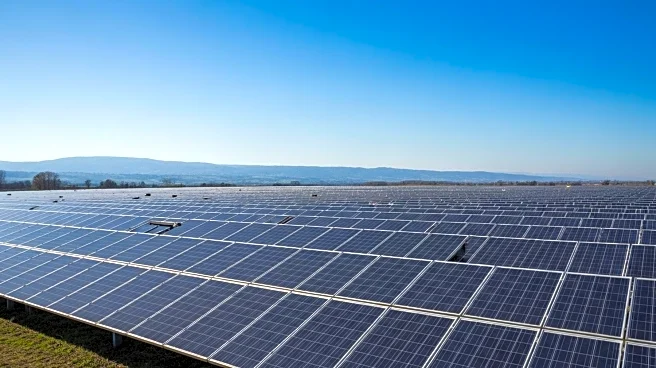What is the story about?
What's Happening?
Toyota Kentucky has inaugurated a 30-acre solar field at its Georgetown manufacturing facility, marking a significant step towards its 2030 net-zero emissions target. The solar installation, which generates 15 million kilowatt hours annually, is capable of powering 1,400 average U.S. homes. This project is part of Toyota's broader environmental strategy to make all North American facilities carbon neutral by 2035. The solar field will provide 4% of the plant's energy needs, reducing reliance on non-renewable sources. Ebonye Allen, Environmental Engineering Manager for Toyota North America, emphasized the project's benefits for the plant, community, and environment.
Why It's Important?
The opening of the solar field is a critical move in Toyota's sustainability efforts, reflecting the automotive industry's shift towards renewable energy. By reducing reliance on non-renewable energy, Toyota is not only lowering its carbon footprint but also setting a precedent for other companies in the region. This initiative supports the company's commitment to the Toyota Environmental Challenge 2050, which aims to achieve positive environmental impacts through various sustainability measures. The project highlights the growing importance of renewable energy in manufacturing and its potential to drive significant environmental benefits.
What's Next?
Toyota plans to continue its sustainability journey, although specific details about future solar installations have not been disclosed. The company is expected to further explore renewable energy solutions to meet its carbon neutrality goals by 2035. This initiative may encourage other automotive manufacturers to adopt similar strategies, potentially leading to broader industry changes in energy consumption and environmental impact.
Beyond the Headlines
The solar field project underscores the ethical responsibility of corporations to address climate change and environmental sustainability. It reflects a cultural shift towards prioritizing eco-friendly practices in industrial operations. Long-term, such initiatives could influence regulatory policies and consumer expectations, driving further innovation in sustainable manufacturing.

















